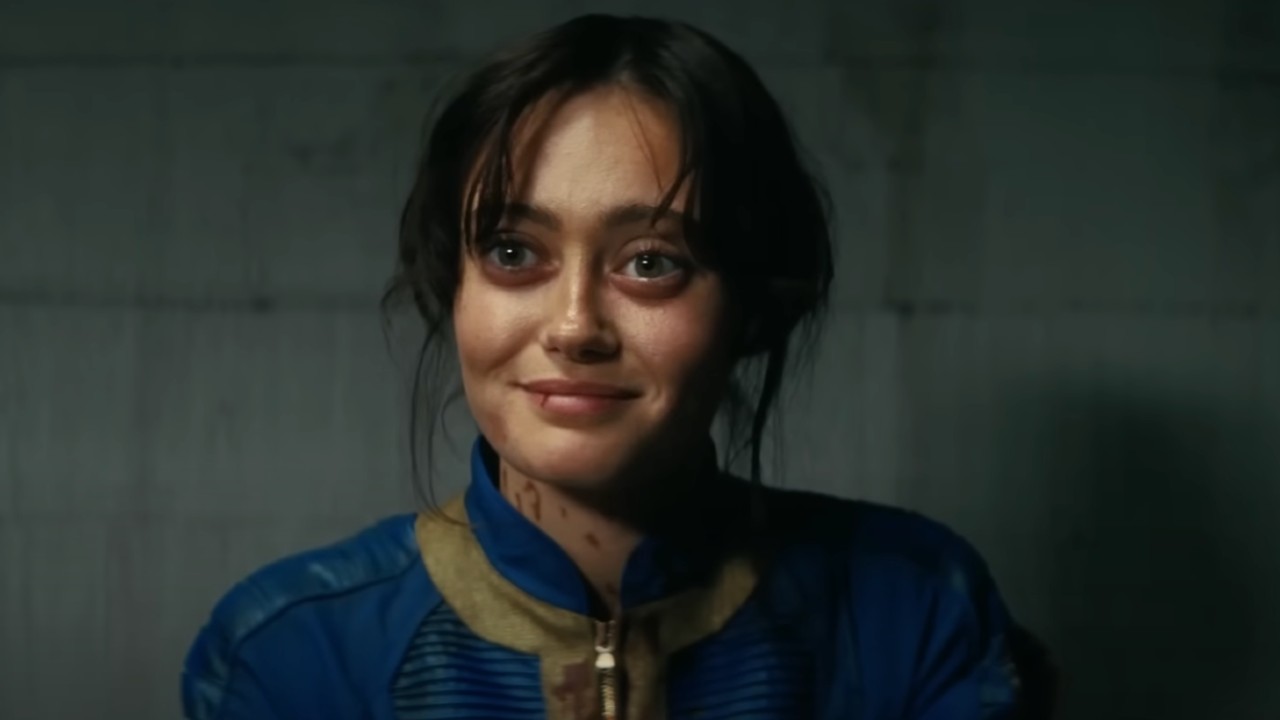Steven Spielberg And Daniel Day-Lewis Delve Into The History And The Mind Of Lincoln
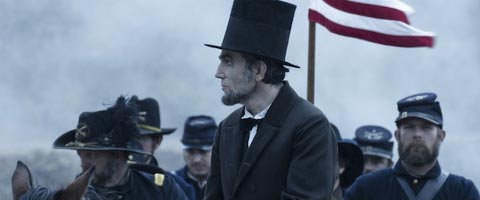
As important as the story of the 16th president is, the reason why people will go to see Steven Spielberg’s Lincoln is because of the pedigree of the director and the performance of its star, Daniel Day-Lewis. But what’s impressive about the film is that once the lights have gone out and the projection has started, you are completely sucked into the 19th century world that the duo creates. In order to achieve this effect both Spielberg and Day-Lewis had to delve deep into the life of Abraham Lincoln, and that was the topic at hand when they spoke recently during a press conference in Los Angeles.
During the conversation, in which I participated, the director and the star touched on a multitude of subjects, including Day-Lewis’ initial hesitation towards taking on the role, the humor of the Civil War president, Lincoln’s relationship with his son, and why it may be misguided to see the film in a modern context. Check it out!
Steven, it seems like you’ve been wanting to do this all your life. What made this a passion project for you? And for Daniel, this is an iconic figure, what did you see as your greatest challenge in bringing him to life?
Daniel Day-Lewis: Apart from everything you mean?
Steven Spielberg: Okay, you want me to go first?
Daniel Day-Lewis: I’m finished.
Steven Spielberg: [Laughs] I’ve just always had a personal fascination with the myth of Abraham Lincoln, and once you start to read about him and the Civil War and everything leading up to the Civil War you start to understand that the myth is created when we think we understand a character and we reduce him to a kind of cultural national stereotype. Lincoln has been reduced to statuary over the last 60 years or more, because there’s been more written about Lincoln than movies made about him or television portraying him. He’s kind of a stranger to our industry, to this medium. You have to go back to the 1930s to find a movie that’s just about Abraham Lincoln. So, I just found that my fascination with Lincoln, which started as a child, got to the point where after reading so much about him I thought there was a chance to tell a segment of his life to moviegoers, and that’s how this whole fascination began.
Your Daily Blend of Entertainment News
Daniel?
Daniel Day-Lewis: I think really the most obvious thing is connected to what Steven was saying, is trying to approach a man’s life that has been mythologized to that extent in such a way that you can get close enough to properly represent it. And I just wasn’t sure that I would be able to do that. Beyond that, I felt that probably I absolutely shouldn’t do that and somebody should do it instead, but [laughs]
Steven Spielberg: It was hard to get him to say yes [laughs].
Daniel Day-Lewis: The wonderful surprise with that man is you begin to discover him, and there are many different ways in which you can do that. He kinda welcomes you in. He’s very accessible. That, that took me by surprise.
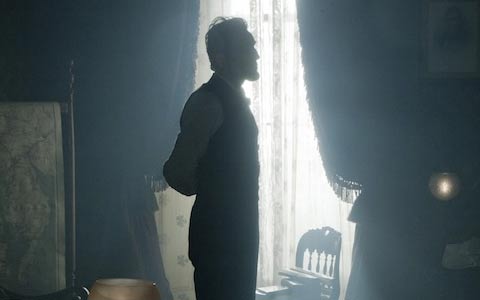
Mr. Day-Lewis, Mr. Spielberg, obviously when you’re creating a character out of a real human being with a tremendous amount not only of biographical data, but in this case, historical, political, etc., what I’m curious about is what thing did you each learn about Mr. Lincoln that you either did not know previously or were most surprised by as a matter of delving into historical materials through this film?
Daniel Day-Lewis: Well, it’s easy for me to start, because I knew nothing about him [laughs]. I had everything to learn, because part from a few images, a statue, a cartoon, a few lines from the first inaugural, a few from the Gettysburg Address, that would be my entire knowledge of that man’s life. I think probably the most delicious surprise for me was the humor, to begin to discover that almost…what an important aspect of his character that was.
Would it be fair to say it’s a very tactical humor?
Daniel Day-Lewis: At times it could be, but not necessarily I don’t think, no. I think it was tactical in the political sense.
Yes, sir.
Daniel Day-Lewis: Yeah, I think at times it was undoubtedly used, in a conscious sense, for some purpose to make some point. There were accounts actually, not exactly what you’re asking, but there are accounts of people that came to ask him a question, of to them great importance, and found themselves in his presence, got a handshake a story, and were out of the room before they even realized [laughs]. And that’s good politics [laughs]. But no, I think it was innately part of him. I think there was very joyful element to that actually, yes.
For you, Mr. Spielberg?
Steven Spielberg: There were so many things I didn’t know about Lincoln, and there are so many different points of view about Lincoln. With over 7000 books written, to find any five books that agree on every single facet of his life is difficult. But the thing that really surprised me about Lincoln was the weight of his responsibility, his oath he took, a constitutional oath to preserve the union, and he’s the only President that had the union ripped out from under him and torn in half. And the fact that the weight of the war that began over slavery, and that he did not himself suffer, beyond all the writings that we’ve read about how deeply low he could get in his psyche, how depressed he could get. I don’t know if some of that depression wasn’t just deep thought, going very, very deep into the cold depths of himself to make discoveries that would bring this war to a close and abolish slavery.
But beyond that, how he just didn’t crack up in the middle of his first term with the Civil War raging around him, with over 600,000 lives lost revised recently upward to 750,000 lives lost. Just in the last five months that figure was revised. And with his wife on the edge of herself, the loss of his son two years before our film begins, Willy, a son lost in infancy before that, the fact that he came through this with a steady, moral compass and an even keel just amazes me.
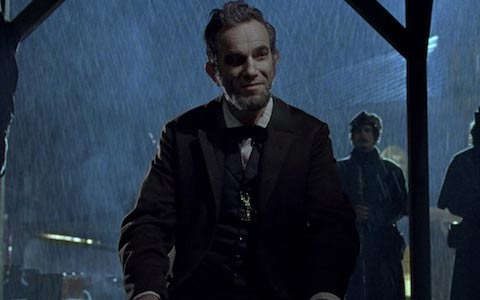
When you’re taking on a particular section of, of Lincoln’s life, how do you decide for the movie where to stop? And was there ever a decision to just have the movie end when the war ends rather than continue on after that?
Steven Spielberg: There was. There was discussion about that as well, but it was very, very important that we felt that Lincoln was able to ride across the battlefield outside of Petersburg, which he did, and have those almost…it was almost the epilogue, between he and Grant, which happened, and the fact that there was some kind of reconciliation in the often written about carriage rides that the President and his wife took. We needed all those moments, I think, to really equip his story of Abraham Lincoln, but I would not have been able to, and Tony Kushner would not have been able… we tried to write Doris [Kearns Goodwin]’s book. His first draft was, as you’ve probably already heard by now, 550 pages long. We needed to focus it in on a working President and a father and a husband. You couldn't do that if that were “the greatest hit list of the life of Abraham Lincoln. It couldn't just be the golden oldies.
Daniel Day-Lewis: A compilation.
Steven Spielberg: The compilation of his entire life. Because we would've been dilatants as filmmakers and as, as actors. We would've just been hitting all the high points and just giving you the headlines and not giving you any sense of the depth of this character, this man.
Mr. Spielberg, you mentioned going back to the 1930s to find films about Lincoln, but I think films about America were a staple of Hollywood for a while, and many of the icons of history were the subject of popular films. Why do you think that fell out of favor and why is the time now right for Lincoln’s story or this chapter in Lincoln’s story?
Steven Spielberg: Well, I would have been very happy to have made Lincoln in the year 2000, the year after I met Doris Kearns Goodwin. It took her a couple years to write the book. It took us more than a couple years to get the screenplay written. So, I wasn’t waiting for a certain time. At one point I flirted with [the movie] coming out on the 200th anniversary of Lincoln’s birth, but we weren’t ready to make the picture then. People say, “Oh, you made it because of what’s happening in politics today.” No, we were ready to make it during the Bush administration. [laughs]. It had nothing to do current politics. It had nothing to do with holding a mirror up to the way we conduct our business on Capitol Hill today. This was meant to be a story, a Lincoln portrait if you will. I think any time is the right time for a very compelling story, any time.
And as far as the, the whole idea of doing historical dramas like this falling out of favor?
Steven Spielberg: I don’t know. I don’t know. I think that there have been historical dramas. I mean, not too long ago we had something called the [The] King’s Speech. Nobody knew anything about [that] -- a lot of people that I know didn’t even know there was a king before Elizabeth [laughs]. And that opened a lot of windows, and people said, “Oh, I learned something I didn’t know before.” There’s no bad time or good time. For me when I find a story that I’m ready to tell and the script is right that’s the time to tell it.
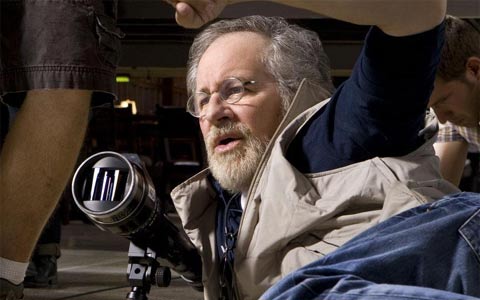
This film really does have a really impressive supporting cast, but during that casting process was there ever any concern about bringing all these big names together and having it distract from A) the story, and B) the titular character?
Steven Spielberg: I think that the people who are in the story, the actors who are in the story, some of them with long filmographies and very well known to the American public, disappear into their characters within seconds of coming on the screen. By the time this film is five, six minutes in they’re all anonymous and they’re all their characters. And that’s the great thing about hiring talented actors. Their job is to convince you of who they are, and that’s what I’m so proud of with this cast.
Daniel Day-Lewis: Just thinking -- sorry, I’m just thinking back on the [previous] question. I’m sorry to interrupt you, but…I mean I’m just sort of reflecting a little bit on my entire life, and I’m thinking that I’ve spent a certain amount of time in 17th Century America, quite a bit of time in 18th Century America, and so much time in 19th Century America that I don’t know if I’ll ever get out to join the modern world [laughs]. So something’s been going on during these years, so they may not count on your list, but my experience is been that historical movies actually are well-presented.
Steven Spielberg: Yeah, that’s true. That’s true. I never realized that.
Mr. Spielberg, in deconstructing Lincoln’s image and icon you had to show him doing certain sort of questionable things in order to get slavery abolished. Do you feel that there is a message in that, and if so how would we apply that outside of a historical context?
Steven Spielberg: No, just desperate times require desperate measures. What Lincoln and the Lobbyist for the Amendment and the Manager of the Amendment and himself, what they did to get this passed was not illegal. It was murky, but what they did was noble and grand. How they went about it was somewhat murky, but nothing they did was really illegal. And by the way, what they did to gain favor, to persuade people to vote - not to vote their conscious – is not uncommon in this day and age either. To make a movie about a squeaky clean person who’s moral principles hold him so far beyond mortal man and woman would not be interesting to me. I like the fact that there is a bit of murkiness in the politics of the 19th Century to do something that was necessary and long-lasting.
Mr. Spielberg, I’m wondering – and I’m not sure if this goes into for lack of a better word, “spoiler territory,” because of the presentation – but as we approach the end of the film I realize I didn’t want to see the assassination and I didn’t want to give the assassins the time of day, but I’m wondering about you making the decision not to depict John Wilkes Booth or the three part assassination attempt at all.
Steven Spielberg: The decision I think was an easy one to make, because I think had we taken it right up to the assassination. I think the film would've for the first time become exploitation, and I didn’t want to go anywhere near that. That’s a very scary word, especially when you’re dealing with the history, and I think that nothing could be gained by showing that, and it was more profound for me to see what actually happened.
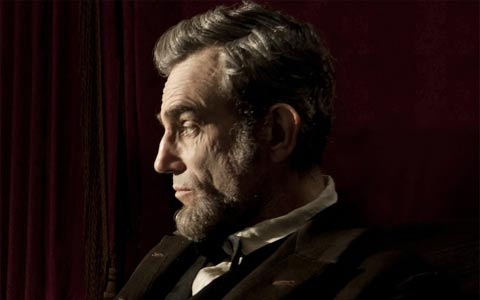
Mr. Spielberg, it sounds like your intention was really to chronicle the dramatic historical time period that Lincoln was at the helm of the country. Because we’re in a politically charged moment in time, people are going to write about this, look at the movie and try to look at it in context to what’s happening today. Do you have any interest in seeing how people interpret it in that way?
Steven Spielberg: Of course. Of course. And, and by the way, here’s the good news. The good news is the Constitution: the Founding Fathers put together the principles of a Democratic Government that are so sound and, and unsinkable that the process from 150 years ago is not that much different than the process of today. I think that really is one of the values of holding up a mirror to all of us who only experience what we experience and have no frame of reference except what we read or what we view in documentaries about that time, that there are tremendous similarities between the politics then and the politics today. And I’m really excited to see how deeply people will reach to, to contemporize our film far beyond how it deserves to be contemporized [laughs].
One of the most relatable and human elements in the film to me was just seeing Lincoln and his son Tad and I was wondering if you could talk a little bit about Lincoln as a father and the very complicated relationships that we see play out.
Daniel Day-Lewis: It certainly seems to be true that there was the relationship between him and his eldest son, Robert, who you see in the film was perhaps the least resolved, the least explored of his relationships. There was a distance there I think largely because of the work that he’d been doing on the judicial circuit, which had taken away from six months of any given year. And also political campaigns and then in office and with Robert at University and so on. But there’d been a certain distance there. By the time we meet him in the story he’d lost two sons. He lost a child when they were in Springfield as well. He had a very interesting attitude towards parenthood, which is surprisingly modern, almost. I think it almost exceeds the degree to which we’re able to be modern [laughs]. And he believed that there was a total absence [laughs] of any parental authority whatsoever. And that was a conscious decision and it may well have been largely influenced by the very harsh disciplinarian that he had as a father himself. And his experience of childhood would've been a very bleak, very difficult one. He was forced to – as many young people were at that time from the moment – I think that they moved from Kentucky to Indiana already he and his sister were struggling to survive almost on their own.
When his father went back to bring what the lady became Mrs. Sarah, who became his stepmother, he was away for a long, long time. And they just had to exist in the wilderness and get on with it. And I think he had to grow up very quickly. His father certainly was not a man who had much tolerance for books, and I think a great conflict. It was no love lost. But he made a wonderful statement. I mean, it’s a strange image to use, cause it conjures up an image of slavery, but I think he used the image of love creates the links that chain a child to the family, to the parent. It’s not dissimilar to that, and the image anyhow is, is about right.
Anyhow, to cut a long story short, there was absolute chaos in the White House, because it I think it actually both through sort of scientific point of view. I think he enjoyed so much watching the chaos that Tad created [laughs]. He was armed to the teeth apart from anything else with all kinds of weapons, cannons, and flint locks, and swords [laughs]. And he had the goat-drawn carriage that he had, which he always kind of careening about the corridors of the White House. And I think Lincoln really enjoyed watching, observing the bedlam that ensued from all his adventures, but also I think it was just pure love. I think he felt such a pure love for love.
I’m not saying that this is good parenting in contemporary times, that you just let them to do whatever the hell they want, but it’s an interesting choice to make at that time in that place [laughs]. And, of course, Mary, again, during this part of the story is more or less an absentee as a parent and therefore the bond between Tad and Lincoln became so very precious to both of them because he was, he was the, the primary, um, parent at that time.
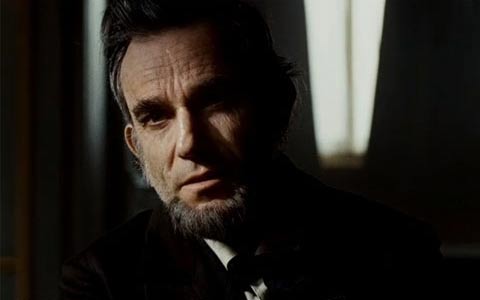
Mr. Day-Lewis, you spoke about your reluctance to take on this role. What was the depth of that reluctance, and talk about the wooing process. How you were won over to this great challenge? And when did you know that it was the right choice to say yes?
Daniel Day-Lewis: Well, I don’t think I ever did know it was the right choice, but I ran out of excuses at a certain point [laughs]. I mean, I understand that it was for Steven to put the idea in front of me… not that I didn’t take it seriously from the word “go,” but it seemed inconceivable to me that I could be the person to help him to do that thing that he wished to do. And least of all did I want to be responsible for irrevocably staining the reputation of the greatest President this country’s ever known [laughs]. Not just in a self-serving way, but quite literally I wouldn't have wished to…it seemed to me a very difficult thing to try and tell that story, very difficult to try and do that in such a way that it could live. And I just really felt I wasn’t the person to do that.
Steven Spielberg: But I felt he was. [laughs] And I stayed. I really tried. I met Daniel eight years ago and couldn’t get him to agree to come down the road with me. And then a couple years ago when Tony Kushner – you remember Tony Kushner was not the first person to attempt to tell a story about Abraham Lincoln for me to direct. And that was the only exposure Daniel had to our Lincoln, was another set that’s really more about the Civil War and all the battles than it was about the Presidency. But when Tony had written his draft that was sort of the first shoe in the door that really got us together in Ireland for the first time to talk about… it was almost like a feasibility study. Daniel was like a feasibility study to see whether he would allow himself to go near a script that was clearly on the verge of brilliance. And at that point, without putting any extra pressure on Daniel, because I didn’t say this to anybody, but if he had finally and ultimately said, “No” I would never had made the movie Abraham Lincoln. It would never have been in my life anymore. It’d be gone.
Daniel Day-Lewis: It really was for me a combination of that meeting, even if nothing had come from it it still would've left me with a really wonderful memory of the time spent talking about Lincoln with Steven and Tony who had become such an important part of their lives - reading Tony’s script, discussing how -- what it might become if Tony were to carry on working on it, because he more or less stopped writing it. It was still an incomplete vision.
Steven Spielberg: Right
Daniel Day-Lewis: And then when Tony went away to begin to continue that work I read Doris’s book, and I think that really became the platform for me, as it had been for Steven and Tony, from which I could believe that there was a living being to be discovered there, because she makes so that beautifully clear in her book. And that had been a great problem for me, not just the responsibility of taking on that task, but really asking the question, has he now been removed for all time, from that possibility because of the iconography surrounding his life?
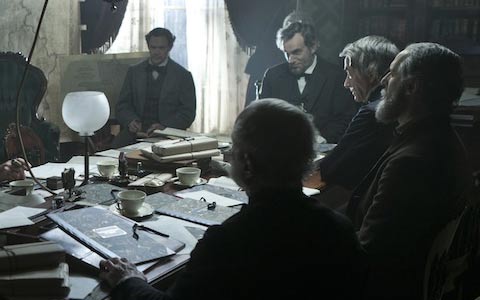
Mr. Spielberg, you’re a filmmaker who’s worked on certain films for years. After watching the movie I can’t imagine someone else playing this role, no knock on Liam Neeson. I read that at one point you were talking to him. Are there sometimes fortuitous times to make a film even though you’ve been working on them for many, many years?
Steven Spielberg: Yes, and, and, and that’s not up to me. Whether it’s fortuitous is something you realize after you’re done. So I think that a lot of planets lined up in a good position, but that was out of my control, and that was not even on my mind at that the time. At that point I had just accepted the fact that I would make Lincoln if Daniel decided to play him, and I would not make Lincoln had Daniel decided not to play him. It was as simple as that. It had gotten to that point with me.
There’s a scene early on in the film where Mr. and Mrs. Jolly visit Lincoln. It’s where you see Lincoln conflicted between his faith in the people and his need to move beyond and do things that he thinks that people need. Could you just talk about that a little bit?
Steven Spielberg: Mm-hmm. Well, the Jolly scene is an interesting scene, because it became an example of Seward’s political brilliance – that he would use these [people] to illustrate a problem that he was not able to illustrate to the President himself. So, through these people he illustrated a problem - are the people going to want to abolish slavery through the passage of a 13th Amendment? And when push came to shove and it came right down to it the people spoke, and they said, “Well, if abolishing slavery will end the war we’ll accept it, slaves going free, if it really puts an end to this war…but if it doesn’t put an end to the war and it’s not gonna serve that purpose we don’t want a former slave coming up and taking our jobs at the war’s end.” And Seward walks over to Lincoln and says “Well, there it is. There’s the voice of the people.” [laughs] So, the entire conundrum that became the entire issue of “Do you end the war first and then attempt to pass slavery or vice a versa,” is illustrated in that single sequence.
To follow up on what you said about this being the portrait of a man in his time. You still leave the theater and can’t help but think that there are still self-evident truths that are in question today and the government is still voting on who’s equal and who isn’t. Any thoughts about that?
Steven Spielberg: Any thoughts about that?
Daniel Day-Lewis: Well, it’s work in progress, isn’t it? Just the word “Amendment” itself is an encouraging thing, isn’t it? It tells of a system of government that allows for the improvement of itself. Just move forward a little bit one day at a time.
Steven Spielberg: Yeah. I agree.
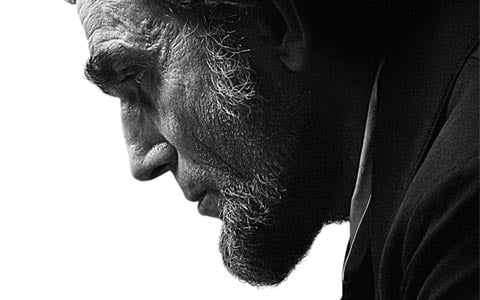
Daniel Day-Lewis: I would love to say just something – I feel I have to, because Liam is a friend of mine, and Liam was committed to Lincoln for a period of time working with Steven, and there came a moment when for reasons that were clear to both of them...
Steven Spielberg: We both decided.
Daniel Day-Lewis: …that Liam needed to do other things. Steven was going to do other things, but Liam, for that period whilst Liam was committed to that project, of course, it wouldn't haven’t occurred to me to consider it. From the moment that Liam decided it was no longer something that he would be engaged with he has been in touch with me about it, and has given me incredible encouragement, and just in the most generous possible way. And encourage me when I was undecided about whether I should do it he gave me a lot of encouragement towards that decision as well. So, I just feel I should say that.
Steven Spielberg: So, the timeline was simply I approached Daniel first to play Lincoln, he turned me down. That was about eight, nine years ago [laughs]. And then Liam and I had a very healthy flirt about possibly doing this together [laughs]. And then we both decided to do other things. And then I came back to Daniel. So, that’s the timeline.
Daniel Day-Lewis: And I can say unequivocally that I know for a fact that Liam’s Lincoln would've been something I would've wished to see. You know, these things are haphazard. You ask about timing. It’s worked out this way. It could easily have worked out the other way, and I think Liam would've been quite wonderful [laughs].
And did you keep this out of the release before the election intentionally? I heard that.
Steven Spielberg: Well, no. What it was very simply is because there’s a lot of confusion about the political ideologies of both parties have switched 180 degrees in 150 years. It just too confusing. Everybody claiming Lincoln as their own. And everybody should claim Lincoln as their own, because he represents all of us, and what he did basically provided the opportunities that all of us are enjoying today. So I just wanted people to talk about the film, not talk about the election cycle. So, I thought it was safer to let people talk about film during the election cycle in this run-up with ads on TV and posters going up and all that, but the actual debut of the film should happen after the election’s been decided. That was my feeling.

Eric Eisenberg is the Assistant Managing Editor at CinemaBlend. After graduating Boston University and earning a bachelor’s degree in journalism, he took a part-time job as a staff writer for CinemaBlend, and after six months was offered the opportunity to move to Los Angeles and take on a newly created West Coast Editor position. Over a decade later, he's continuing to advance his interests and expertise. In addition to conducting filmmaker interviews and contributing to the news and feature content of the site, Eric also oversees the Movie Reviews section, writes the the weekend box office report (published Sundays), and is the site's resident Stephen King expert. He has two King-related columns.
